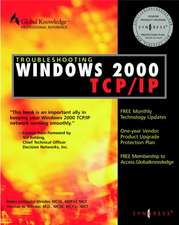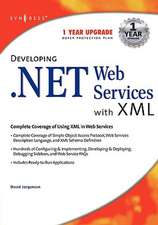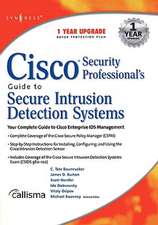Checkpoint Next Generation Security Administration
Autor Syngressen Limba Engleză Paperback – 10 apr 2002
Check Point Software Technologies is the worldwide leader in securing the Internet. The company's Secure Virtual Network (SVN) architecture provides the infrastructure that enables secure and reliable Internet communications. CheckPoint recently announced a ground-breaking user interface that meets the computer industry's Internet security requirements. The Next Generation User Interface is easy to use and offers unparalleled security management capabilities by creating a visual picture of security operations.
CheckPoint Next Generation Security Administration will be a comprehensive reference to CheckPoint's newest suite of products and will contain coverage of: Next Generation User Interface, Next Generation Management, Next Generation Performance, Next Generation VPN Clients, and Next Generation Systems.
CheckPoint are a company to watch, they have captured over 50% of the VPN market and over 40% of the firewall market according to IDC Research
Over 29,000 IT professionals are CheckPont Certified
This is the first book to covers all components of CheckPoint's new suite of market-leading security products - it will be in demand!
Preț: 450.35 lei
Preț vechi: 562.93 lei
-20% Nou
Puncte Express: 676
Preț estimativ în valută:
86.17€ • 90.21$ • 71.30£
86.17€ • 90.21$ • 71.30£
Carte tipărită la comandă
Livrare economică 05-19 aprilie
Preluare comenzi: 021 569.72.76
Specificații
ISBN-13: 9781928994749
ISBN-10: 1928994741
Pagini: 800
Ilustrații: 1
Dimensiuni: 152 x 229 x 42 mm
Greutate: 1.32 kg
Editura: ELSEVIER SCIENCE
ISBN-10: 1928994741
Pagini: 800
Ilustrații: 1
Dimensiuni: 152 x 229 x 42 mm
Greutate: 1.32 kg
Editura: ELSEVIER SCIENCE
Public țintă
Networking Security professional responsible for deploying CheckPoint security solutionsNetworking, Security
Cuprins
Chapter 1: Introduction to Check Point Next Generation
Chapter 2: Installing and Configuring VPN-1/FireWall-1 Next Generation
Chapter 3: Using the Graphical Interface
Chapter 4: Creating a Security Policy
Chapter 5: Applying Network Address Translation
Chapter 6: Authenticating Users
Chapter 7: Open Security (OPSEC) and Content Filtering
Chapter 8: Managing Policies and Logs
Chapter 9: Tracking and Alerts
Chapter 10: Configuring Virtual Private Networks
Chapter 11: Securing Remote Clients
Chapter 12: Advanced Configurations
Chapter 2: Installing and Configuring VPN-1/FireWall-1 Next Generation
Chapter 3: Using the Graphical Interface
Chapter 4: Creating a Security Policy
Chapter 5: Applying Network Address Translation
Chapter 6: Authenticating Users
Chapter 7: Open Security (OPSEC) and Content Filtering
Chapter 8: Managing Policies and Logs
Chapter 9: Tracking and Alerts
Chapter 10: Configuring Virtual Private Networks
Chapter 11: Securing Remote Clients
Chapter 12: Advanced Configurations


























